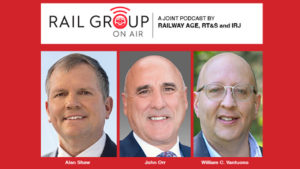UTU fights Amtrak snow removal waiver
Written by jroodThe UTU, BLET, the Brotherhood of Maintenance of Way Employes Division, the Brotherhood of Railroad Signalmen and the American Train Dispatchers Association have asked the FRA to deny an Amtrak request to waive permanently the existing mandatory and safety-critical functions governing passenger-platform snow removal outside the Northeast Corridor.
The result would be the
scrapping of on-track safety protection for Amtrak employees as well as
contractor employees. Amtrak withdrew an earlier waiver request — also opposed
by the UTU and the others labor organizations — that would have required a
conductor to coordinate platform snow removal to the detriment of the conductor’s
other safety critical functions.
The existing roadway worker
protection provisions Amtrak seeks to scrap are found in the Code of Federal
Regulations, Volume 49, Section 214.335, which describe on-track safety
procedures for roadway worker groups.
Amtrak now is asking that
its employees and contractor employees be permitted to remove snow from station
platforms with no real on-track safety in effect. If granted by the FRA, said
the labor organizations, there would be "no means whatsoever for a roadway
work group to establish on-track safety through the dispatcher or control
operator, establish on-track safety through train coordination or train
approach warning, or otherwise withhold trains from the work area.
"Amtrak seeks to
permanently remove the mandatory and safety-critical functions of the roadway
worker in charge from station platform snow removal operations and proposes to
substitute minimal ‘procedures’ for roadway worker groups engaged in snow
removal at high- and low-level passenger platforms nationwide," said the
labor organizations in asking the FRA to deny the Amtrak waiver request.
"Under Amtrak’s waiver
request," said the labor organizations, "Amtrak employees and
contractor employees will perform this dangerous work on passenger platforms in
high-speed territory, utilizing both power tools and hand tools, all while
unsupervised and unprotected by a qualified roadway worker in charge.
"This work, by its
very nature, is most often performed in extreme weather conditions that can
affect a worker’s alertness and judgment. These workers will necessarily be
dressed in heavy winter clothing, which can adversely affect the workers’
vision, hearing, agility, and ability to react to unanticipated danger. Such
extreme working conditions underscore the need for full compliance with federal
on-track safety regulations to protect roadway workers," the labor groups
told the FRA.
Additionally, the labor
organizations said, "by removing the roadway worker in charge, the waiver
will severely impede the ability of roadway workers to make a good faith
challenge. First-level good faith challenges are, in virtually all cases,
presented to the designated roadway worker in charge, who is uniquely qualified
and equipped to immediately rectify safety-related matters on-site and in real
time.
"The waiver would set
back our joint industry-wide efforts to reduce, and ultimately eliminate, the
unacceptable death toll among roadway workers nationwide," said the labor
organizations.





